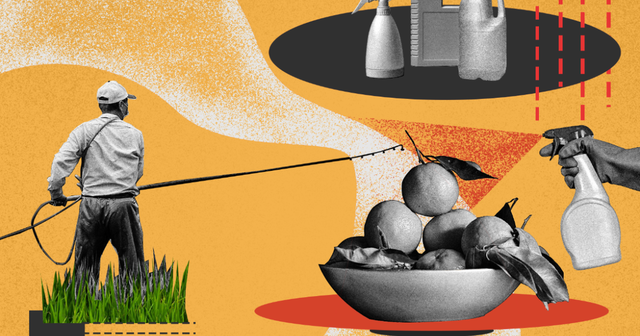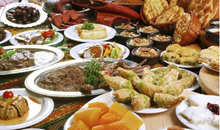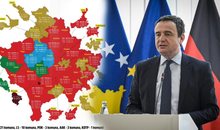
 Flash News
Flash News
Rama 'waves' the integration card with the Albanians of Greece: Give me your vote, I'll give you integration
He raped his sister-in-law and her minor children, 35-year-old man arrested in Fier
After the month of Ramadan, Muslim believers celebrate Eid al-Fitr today
Morning Post/ In 2 lines: What mattered yesterday in Albania
Explosive explosion in Patoku Lagoon, damaging the environment near a bar
"Genocide against the population", BIRN: Carcinogenic pesticides banned in Europe are being traded in Albania

On November 29, a shipment of mandarins produced in Albania was stopped in Croatia after tests showed the presence of Chlorpyrifos – a pesticide banned by the European Union since 2020. The case was made known by RASFF – the Rapid Alert System for Food, a network that facilitates the exchange of information between EU member states on issues related to food safety.
This was not an isolated case of banning tangerine exports from Albania, while tangerines are not the only product identified with a load of banned pesticides in recent years in the country. Data collected by BIRN and interviews with experts show that the government neglected the continuous and timely monitoring of pesticide use due to a lack of human capacity and legal uncertainties, leading to the trading of agricultural products above the permitted norms.
Authorities also turned a blind eye to farmers' use of dangerous pesticides, banned for years in EU countries, raising concerns about food safety and the quality of Albanian exports. The Ministry of Agriculture admitted in response to a request for information that during 2024 alone, laboratory tests on fruits and vegetables found 7 banned pesticides such as; "chlorpyriphos, chlorfenapyr, chlorpyriphos methyl, linuron, dimethoate, myclobutanil and omethoate".
Representatives of private laboratories told BIRN that they have found many cases of banned Plant Protection Products (PPPs) in their analyses.
“There are around 35 banned pesticides circulating in Albania,” Sokol Abazi, a chemist and consultant at the Tenius laboratory, told BIRN, referring to the findings of this laboratory's analyses in 2024 alone.
In December 2019, the Standing Committee on Plants, Animals and Food decided to ban the use of the pesticides 'chlorpyrifos' and 'chlorpyrifos-methyl' in the member states of the European Union, based on study findings that their use had a negative impact on human health, with a toxic effect on the development of the nervous system and genetics.
The European Commission officially adopted regulations to ban their use in January 2020, providing for a 3-month transitional period for member states to collect and permanently destroy all Plant Protection Products (PPPs) containing 'chlorpyrifos' and 'chlorpyrifos-methyl'. After this deadline, they could no longer be marketed and used within the EU.
Following the EU's example, Albania decided to deregister PPPs containing these two toxic ingredients, but unlike the EU, Albanian traders were given the right to import products containing these two pesticides until March 2020, and their use on the market was allowed for at least another two years.
Legal provisions regulate the import and use of PPPs in two lists; those that are allowed to be imported – if they are previously registered in at least one EU member state, and a second list, where prohibited, but already imported, PPPs are allowed to be traded and used by farmers until their expiration date.
Based on these criteria, the Ministry of Agriculture and Rural Development banned the import of pesticides with 'chlorpyrifos' in January 2020, but they remained on the second list at least until August 2022 and, as official data and laboratory analyses suggest, these toxic substances continue to be used on Albanian farms.
Farmers who use them seem to be motivated by the high efficiency of these pesticides and their lower price compared to other products. “These kill insects,” a farmer who has greenhouses for growing various vegetables told BIRN. He also admitted that the banned pesticides were easy to find in any agricultural pharmacy and were sold under different trade names or packaged under the name of another product.
Meanwhile, a fruit and vegetable exporter, speaking on condition of anonymity, told BIRN that he believed that tonnes of banned EU PPPs were sold very cheaply or given to Albanian traders, causing them to be used without any surveillance. The trader in question, who admitted that some of his cargoes were stopped at the EU border, blamed state institutions for not guaranteeing that products were produced to EU standards. “The cost then falls on us,” he complained.
The use of pesticides in agriculture is very important for their protection from insects and other pests, but according to experts, their use above the permitted norms creates health risks, mainly in population groups such as children, pregnant women, the sick and the elderly.
Ferdi Braushi, professor at the Department of Environment and Natural Resources at the Agricultural University of Tirana, states that the continuous consumption of products with pesticides above the permitted norms creates long-term effects on the body by affecting the endocrine and nervous systems.
"As a rule, a pesticide is withdrawn from use when it is found that, in addition to protecting the plant from insects, it also harms other organisms that could be harmful to the surrounding environment or human health," he told BIRN.
Braushi sees as problematic the delay in the reaction of Albanian institutions in removing pesticides banned by the EU from the market - allowing their use for 1-2 years after they have been banned, as well as the lack of capacity to timely analyze the level of pesticide use on farms. According to him, this creates uncertainty for the products we consume on a daily basis.
Data obtained by BIRN, through requests for information and official documents, show that state agencies responsible for consistently monitoring the use of PPPs in tabletop products have failed, due to legal ambiguity, negligence and lack of capacity.
The National Food Agency (AKU) and the Food Safety and Veterinary Institute (ISUV) are responsible for conducting inspections and testing samples of products that are traded, but they failed to fulfill this legal obligation for years, conducting few, delayed analyses.
The failure to conduct analyses by ISUV caused the failure of the AKU's plans for the analysis and quality control of pesticides for the years 2017, 2018 and 2019. In the few cases that the samples taken by the AKU were analyzed, their results came out 6-7 months to a year late, when the food products found with pesticides above the allowed rate had already been sold on the market.
The above data was found in the 'draft action plan' document for the sustainable use of PPPs of the Ministry of Agriculture, where the failure to return analysis responses from ISUV on time is considered a major problem in sustainable monitoring of the use of PPPs.
"The delay in receiving test results or the failure to receive test results from the ISUV laboratory remains concerning, as it reduces the effectiveness of taking appropriate measures to guarantee food safety, to track the traceability from the commercial unit or collection point to the producer farmer," the document states.
Meanwhile, the only large-scale monitoring of the use of PPPs was carried out in 2023, from the end of June to the end of August, and the results showed that out of 178 samples taken from the roots, 56 of them contained traces of prohibited substances.
The Ministry of Agriculture did not make the analysis report available, but admitted in a written response that '12 unregistered active substances - 3 of which are permitted in the EU' were found in the analyzed plants.
"From the analysis carried out regarding the banned active substances, two of them, Chlorfenapyr and Chlorpyrifos, remain an ongoing problem in a regional approach and from EU countries such as Italy and Greece, as evidenced in the RASFF system and in ISUV analyses," the ministry told BIRN.
Vulnerable consumers
The AKU takes the analysis samples from the end trader, without being able to trace the farm where they were produced, a task that the laws assign to another agency established with the aim of identifying plant problems at the root.
The National Veterinary and Plant Protection Authority (AKVMB), established in 2019 with a regional scope, failed to conduct inspections on farms due to legal uncertainties and only assumed the powers of the inspectorate in September 2024, after the issuance of an order by the Prime Minister.
"The goal is to start inspections by this institution from 01.03.2025," said the Ministry of Agriculture.
Although it did not have an inspection function, according to the ministry, this agency responded to the requests of the regional directorates of the NFA and during 2024 it carried out traceability verification for 73 cases with pesticide residues above the permitted level and distributed PPP registers to thousands of farmers, a document that is expected to raise awareness among the latter about the responsible use of pesticides.
The ministry says that the results of the analyses conducted and the monitoring have prompted it to take a series of measures and strategies to improve the situation, but for experts, the situation of uncontrolled use of PPPs in products that are consumed is alarming and state institutions are not playing their role, leaving consumers facing food insecurity.
According to environmental safety expert, Ferdi Brahushi, Albanian consumers are unprotected.
"They must be protected by institutions, which must conduct analysis and monitor products with a high potential risk of pesticides above the permitted norms, such as high-intensity cultivation in greenhouses, vineyards, olive groves," he told BIRN.
He explains that it cannot be claimed that there are no traces of PPPs in products, and that they can even appear 2-3 decades after they are no longer used, as they remain in the soil and air.
"What must be kept in mind is that PPPs should not exceed the permitted levels," emphasized Brahushi, adding that "when their levels are above the norm, they accumulate in the human body through food or water and can damage the endocrine and nervous systems, or affect the reproductive system, as well as have carcinogenic effects."
For Sokol Abazi, the situation is more than alarming and institutional irresponsibility has led to endangering the lives of citizens.
“There is a total lack of control, of the products we eat, of the water, of the air,” he says. “This is a genocide against the population,” Abazi added.
According to him, no state institution has the capacity to control the entire chain of import and trade of PPPs and their use on farms.
The total area of agricultural land cultivated with vegetables, greenhouse vegetables, citrus fruits, orchards, olive groves and vineyards exceeds 66 thousand hectares in Albania, while data suggests that there are 280 entities licensed by 2020 for the import and trade of PPPs.
Experts point out that the problems in the sector are not only related to monitoring the level of PPPs, but also to their import control, trade, storage and disposal.
Brahushi suggests that legal provisions for the disposal of a PPP, which is considered dangerous, should be aligned with those of the EU.
"The time period from the import ban to the time allowed for the use of prohibited products should be narrowed and trading points should be obliged to collect and eliminate them," he says.
But, according to him, this requires an inventory of pesticide imports, an analysis of the active ingredients in imported pesticides, and monitoring of their disposal.
The Ministry of Agriculture itself admits that it does not have the capacity to eliminate banned PPPs, risking that they will circulate among farmers illegally.
NFA inspections found that in retail and wholesale units of PPPs, PPPs that do not meet legal requirements such as: expired/expired expiration date or PPPs not registered in Albania have been found, which have been blocked in a total quantity of 1.3 tons and 1271.1 liters, for the years 2017-2020.
Meanwhile, data from the Ministry of Agriculture, cited in the "2022-2032 action plan", indicate a lack of capacity to dispose of blocked and banned PPPs, leaving these products for years in the premises of wholesale and retail trade units.
For the period 2017-2020, there were about 2.5 tons of such pesticides blocked/banned, while the ministry admits that "the blocking of PPPs for years due to non-compliance with their disposal process remains a serious concern for human health and the environment."
Experts also demand that control protocols be followed equally for both domestic and imported products, for which the Albanian state seems to have so far been satisfied with a certificate of origin for the goods.
"Their presence (Chlorfenapyr and Chlorpyrifos) has also been found in imports from Italy and Greece, which has led to increased controls on imports from these two countries," the Ministry of Agriculture admitted.
In 2024 alone, there were 9 cases of imported products that were addressed to the RASFF system./ BIRN
Latest news


Kur Evropa zhvendos vëmendjen, çka ndodh me Kosovën?
2025-03-30 20:24:59


Car crashes into Thumana-Milot road divider, driver and 2 passengers injured
2025-03-30 19:03:26
5 types of men you should avoid
2025-03-30 18:41:01

Iran's president rejects Trump's call for nuclear talks
2025-03-30 18:07:55





Netanyahu defies International Criminal Court, travels to Hungary on April 2
2025-03-30 16:21:48
The impact of the time change and tips for adapting
2025-03-30 15:56:00
39-year-old man raped in Tirana, two arrested, one criminally prosecuted
2025-03-30 15:32:15
Letter Reveals Real Reason Tupac and Madonna Split Published
2025-03-30 15:00:09
Search in the apartment, sisters Xhovana and Alda Nikolli's phones are seized
2025-03-30 14:51:49
Two people go missing in Tirana
2025-03-30 14:42:15
Here are the behaviors in children that you should never ignore
2025-03-30 14:20:50





Caught with bags full of cannabis, 43-year-old man arrested
2025-03-30 11:56:52

Berisha congratulates Eid al-Fitr: Friday prayers will be determined by law
2025-03-30 11:25:46

"Opponents are copying our program", Berisha: We will offer real support
2025-03-30 10:55:35

Berisha: Young people will be the face of the DP campaign
2025-03-30 10:34:50



Lemon water, learn why you should use it for digestion
2025-03-30 09:34:02

Weather forecast for today
2025-03-30 08:35:41
You will have some challenges at work, the stars' forecast for today
2025-03-30 08:20:12
Daylight saving time returns, clocks go 60 minutes ahead
2025-03-30 08:03:18
After the month of Ramadan, Muslim believers celebrate Eid al-Fitr today
2025-03-30 07:49:55
Morning Post/ In 2 lines: What mattered yesterday in Albania
2025-03-30 07:45:33
Zelenskiy says Ukraine expects strong Western response to Russian drone attacks
2025-03-29 21:56:41

Knife fight in Pogradec, 36-year-old injured
2025-03-29 21:14:18


Lawyer Visha: Justice Reform Failed, Lawyers' Work Diminished
2025-03-29 20:19:52






European passport, Balkan standards!
2025-03-29 17:45:21
Explosive explosion in Patoku Lagoon, damaging the environment near a bar
2025-03-29 17:22:17


Court blocks Trump's efforts to 'shut down' Voice of America
2025-03-29 16:10:24
Death toll from powerful earthquake in Myanmar rises to around 1,600
2025-03-29 15:52:39


Bardhi: Rama copies the DP program, but change only comes with his departure
2025-03-29 14:56:27


Kamza / Triple accident at Valias turn
2025-03-29 13:54:09



Serbian oil industry says US sanctions against it have been postponed again
2025-03-29 12:36:55






EU offers €2.5 million in emergency aid to Myanmar after devastating earthquake
2025-03-29 10:10:03

Even coffee is expected to become a luxury for Albanians
2025-03-29 09:41:55
Analysis: Why is recognition by Kenya important for Kosovo?
2025-03-29 09:31:35
Daylight Saving Time returns on Sunday, March 30th! Clocks go forward 60 minutes
2025-03-29 09:11:36

Accident in Lushnja, three people injured
2025-03-29 08:42:44
Analysis: Why young entrepreneurs seek to enter Parliament
2025-03-29 08:34:34
Weather in Albania today: Rain and low temperatures
2025-03-29 08:17:48
Morning Post/ In 2 lines: What mattered yesterday in Albania
2025-03-29 08:07:39
Basha and Alibeaj with new parties, Tabaku: Whoever does not unite, serves Rama
2025-03-28 22:55:39

"The citizen identifies you in this way," Tabaku reveals her campaign strategy
2025-03-28 22:00:45
QSUNT Emergency/ Broken equipment and long queues, alarming situation
2025-03-28 21:57:10


Brazilian salmonella and the European passport
2025-03-28 21:31:06





Shkodra Elektronike releases the official video clip of "Zjerm"
2025-03-28 20:19:33
